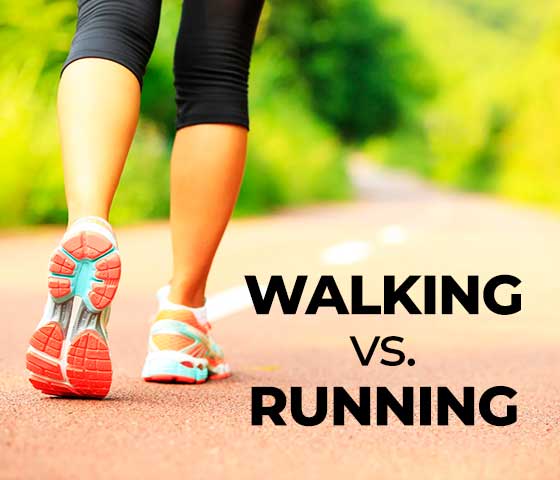Both walking and running have physical and mental health benefits. They allow you to exercise without special equipment, can give you time in nature (which offers added health benefits), and can provide social opportunities if you walk with a friend or do races with a group.

Running might be the right choice for you if you enjoy higher-intensity exercises. It allows you to burn more calories per minute, which may increase weight loss. On the other hand, walking is a great option if you are just starting a fitness routine. It is accessible for most people and is a great way to ease into exercise. Because it’s low-impact and less intense than running, it’s a great place to start if you’re beginning.
However, if in addition to walking or running you are looking for an exercise routine to improve your health and quality of life, come talk to us at Revolve Physiotherapy in Milton, Ontario. Our team of experts will guide you with personalized exercises and stretches, meeting your particular needs and goals.
Walking Benefits:
Low Impact: Walking is easier on the joints and less likely to cause injury compared to running. Beginners or those with health issues might find walking more suitable initially.
Accessibility: You can walk almost anywhere without special equipment or preparation. However, wear reflective material and other safety gear if walking or running outside.
Weight Loss: Walking can help with weight loss and management, especially when combined with a healthy diet.
Heart Health: Regular walking improves cardiovascular health and reduces the risk of heart disease. Start slowly and choose a manageable goal and increase your exercise slowly.
Mental Health: Walking can reduce stress, improve mood, and enhance overall mental well-being. Choose walking for general health and longevity.
Running Benefits and risks:
Higher Calorie Burn: Running burns more calories per minute compared to walking, making it more efficient for weight loss. Running burns about 15.1 calories per minute, while walking burns about 8.7 calories per minute for a 160-pound person.
Cardiovascular Fitness: Running improves cardiovascular endurance and overall fitness more rapidly than walking.
Bone Health: Running can strengthen bones and improve bone density, reducing the risk of osteoporosis. While both running and walking improve bone density, research shows runners tend to have stronger bones than people who walk for exercise.
Time Efficiency: Running provides a more intense workout in a shorter period, making it suitable for those with limited time.
Injury Risk: Running has a higher risk of injuries like shin splints, knee pain, and stress fractures. Running is a high-impact, vigorous exercise, so it has more potential for risk than walking does.
Both walking and running have their own set of benefits, and the choice depends on your fitness level, goals, and personal preferences. Mixing both activities into your routine can also be beneficial, providing variety and comprehensive health benefits.

You can increase your walking calorie burn by walking on an incline or adding a weighted backpack. Remember, moving is one of the most important things you can do for your health, whether you’re moving at a walking, jogging or running pace. Always talk with your healthcare provider before starting a new exercise regimen, especially if they’re helping you manage any underlying health concerns.
Walking vs. Running! Get your personalized exercises routine at Revolve Phisiotherapy. You will meet the best team in Milton. Call us now (905) 864.8181 and talk to one of ours specialist.
